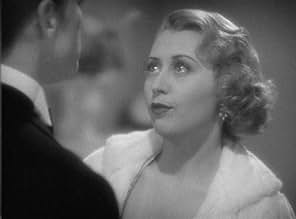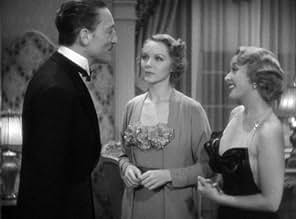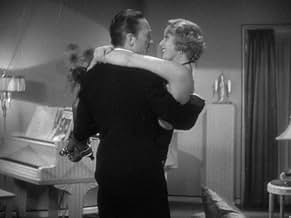Añade un argumento en tu idiomaVicki Wallace teases her husband Tony until he hits her. After divorcing and marrying Vernon, her behavior leads to similar results. She returns to Tony's place, where drama unfolds with his... Leer todoVicki Wallace teases her husband Tony until he hits her. After divorcing and marrying Vernon, her behavior leads to similar results. She returns to Tony's place, where drama unfolds with his date Bonnie and Vernon's friends.Vicki Wallace teases her husband Tony until he hits her. After divorcing and marrying Vernon, her behavior leads to similar results. She returns to Tony's place, where drama unfolds with his date Bonnie and Vernon's friends.
- Dirección
- Guión
- Reparto principal
- Model
- (sin acreditar)
- Judge
- (sin acreditar)
- Duryla Model
- (sin acreditar)
- Court Spectator
- (sin acreditar)
- Court Recorder
- (sin acreditar)
- Mrs. Crosby's Mother
- (sin acreditar)
- Nightclub Patron
- (sin acreditar)
- Model
- (sin acreditar)
- Court Clerk
- (sin acreditar)
- Nightclub Patron
- (sin acreditar)
Reseñas destacadas
At the same time, catch the sexy Vicky (Blondell) as she endlessly rolls and unrolls her hosiery, that is, when not fitting into backless evening wear or craving a little rough man-handling. In short, it's the kind of provocative material that soon brought down the heavy hand of Hollywood censorship. (Scope out the very last scene that I expect challenged even the loose conventions of the time.)
The women are well cast, including the eye-rolling Blondell, a dryly sensible Claire Dodd, and a sweetly seductive Joan Wheeler. The problem is with the two male leads. Now, I'm a big fan of Warren William who's unequalled in ruthless, authoritative parts, e.g. Employee's Entrance (1933), Skyscraper Souls (1932), which remain true period classics. The trouble is that the role here of the discombobulated husband Tony calls for the light comedy skills of a William Powell, for example; the aristocratic William does try hard, but lacks that particular flair. Also, the naturally comedic Horton is memorable in eccentric parts, but is unfortunately miscast here as a strait-laced, jealous husband.
At the same time, director Florey doesn't manage the kind of zany pacing that could have smoothed over some of the questionable parts. Too much of his deliberate tempo comes across like the stage play the material is adapted from. As a result, the movie has its moments—mainly the super coy Blondell and a provocative parade of 30's fashions—but is otherwise a titillating disappointment.
In many ways, this is a deeply cynical film (witness the running commentary from the two constant house guests) about public and private lives, the last gasp of pre-code comedy before the censors came down hard on creative expression of and shuttered them into the kitchen with their aprons for the next thirty years or so, when Elizabeth Taylor and Richard Burton exposed a more modern version of the S/M games that can develop when love is stunted by circumstance. This is not a great film by any measure, but viewed in an unusual context can be great fun.
Apart from Frank McHugh's comedy relief character, none of the other characters are that likeable - they're not black and white but a lot more multi dimensional than is typical from films of this era. Even Joan Blondell is horrible whilst at the same time being utterly desirable and makes her character completely believable as someone who can manipulate these weak men, well to be honest, all men.
In typical 1930s penny-pinching WB style, this was all put together in just three weeks with people working 14 hour days. Joan was having her own serious marriage problems at the time and was so over-worked that she collapsed from mental exhaustion shortly after this was finished. Despite this and the perceived light-hearted approach to violence towards women - which is a little uncomfortable to watch (but when viewed in the context of these damaged characters makes sense), Smarty is still fun to watch and Joan somehow manages to look amazing and be convincing.
Considering it's a rush-job, it's reasonably well directed although a bit stagey at times and well acted even by WE and EEH who are out of their usual comfort zones. Overall - an enjoyable fun picture that's also a lot deeper and more thought provoking than you'd expect.
He does, and fast forward and Vicki has married Vernon. But the grass is not greener. Vicki finds herself bored with Vernon's kind and giving ways and decides she wants her first husband back. Complications ensue.
It really pains me to give a movie with the best WB had to offer in comedy in front of the camera in 1934 only a mediocre grade. But the characters are cardboard and the very thin humor wore on me after a very short while. And Blondell is playing one of the most annoying nagging characters in the history of film, although she is playing it tongue in cheek. How I felt about this film was very similar to how I felt about the very first production code comedies because they often substituted shouting and motion for that great precode bite and energy.
¿Sabías que...?
- CuriosidadesTony tells Vicki that he's been going to the movies quite a lot recently, and there the women are quite different: "They get pushed in the face with grapefruit and they love it." This is a reference to El enemigo público (1931) with James Cagney, who famously shoved half a grapefruit into Mae Clarke's face. Joan Blondell also was in that film, so this apparently is an inside joke.
- PifiasAt the 4 minute mark the boom mic shadow moves on the wall by the book shelves.
- Citas
George Lancaster: Love is the illusion that one woman differs from another.
- ConexionesReferences El enemigo público (1931)
- Banda sonoraBridal Chorus
(1850) (uncredited)
from "Lohengrin"
aka "Here Comes the Bride"
Music by Richard Wagner
Performed by the Vitaphone Orchestra
Variation played when marriage is announced in gossip column
Selecciones populares
Detalles
- Duración1 hora 5 minutos
- Color
- Mezcla de sonido
- Relación de aspecto
- 1.37 : 1




































